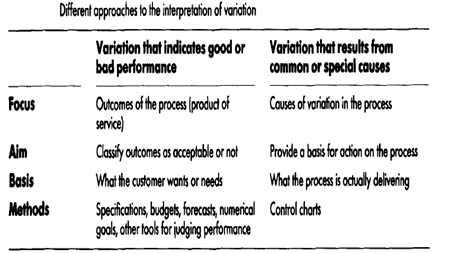SKEDSOFT
Introduction:
Processes within business organisations are no exception and are often subject to variation. There are two causes of variation - common causes and special causes.
Common and special causes of variation:
Random causes:
1. Procedures and methods used;

2. Education and training given;
3. Passing traffic;
4. Machine movement;
5. Temperature changes.
Assignable causes:
1. Tool wear;
2. Material variation;
3. Poor maintenance;
4. Operator performance;
5. Electric power surge;
6. New methods, procedures;
7. Inexperienced or untrained operators.
Different approaches to the interpretation of variation:
The implications of variation:
The ‘hidden’ impact of variation was only made visible because TQM calls for processes to be rendered simple and visible so that improvement can become a realistic target. Variation was previously hidden by what has been termed ‘buffers’.
Benefits of studying variation:
Benefits from studying variation can perhaps be analyzed at three levels:
1. Closeness between competitive objectives and organisational capability: organisations will be able to compete on realistic grounds rather than in the land of ‘make believe’ as has been the case for the majority of organisations and for a long time.
2. Value added activity becomes decentralized showing that improvements can take place in every single aspect of the organisation. This, therefore, will remove the myth that only production adds value and stops distinguishing between what traditionally has been referred to as SUPPORT activities and LINE activities;
3. Organisational climate based on team work, group effort and organisational objectives.
There can be many more advantages resulting from the study of variation. Depending on the level of commitment and determination to incorporate process improvement at the heart of business activities, the degree of benefits achieved will vary from organisation to organisation.